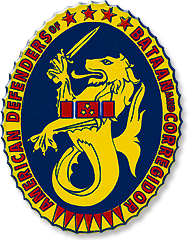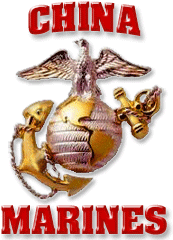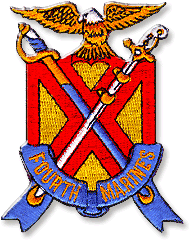|
THE EDGE |
|
|
|
Additional Writings from The Edge |
|
|
|
FROM THE DIARY |
|
Editor’s note: What follows
are excerpts from George’s diary, painstakingly scrawled in tiny, hard to
read script, that offer an insight into the deepest thoughts of a 22 year
old Marine corporal who reveals a deep interest in philosophy, of poets and
writers from Socrates to Kipling, from Keats to the Russian Pushkin. Many of
these works were carefully copied in his diary--the words memorized and
repeated hundreds of times.
Still, George‘s favorite is the following, which he insists was not inspired
by Omar Khyam: |
Oh, my friend, the greater
gift you gave me
I could not repay for infinity
but know that this that in my most secret shrine
for you I break the bread and proffer wine. |
|
|
|
April 26, 1945
“I cannot call this small book a diary. I have no desire to record dismal
events in their
passage during the week, rather, I would like to make this a record of my
mental progressions, my reactions to the matters that seriously take hold of
and involve my thinking. Moreover, I hope through these jottings to learn
more of myself - of both the good things and the bad - and to profit by what
I have learned."
May 2, 1945
“Problem: How many times I have formed an idea to completion in my mind
warmly imbued with its possibilities. Only to "step-down" to work on it
finding myself with the hard realism of technique and approach -- my pen
paralyzed and the ink frozen in the well."
"I find myself captivated more everyday in my study of words. To me a
fascinating employment from other things and which gives me endless hours of
pleasure."
"I do not believe I have any right to condemn my fellow man for any of his
actions or opinions without full knowledge of him, his environment, his
influences -- without compassion for these mortals that surround me."
"I am ambitious to perfect myself in whatever way I can but mostly to live
in peace with my fellow man."
"I believe most of the things I treasure are those which I have stored up in
my mind -- the art, the strains of music that have so stirred me in the past
-- the beauty I have found."
"First I believe sincerity closely bound with truth must be the basic
essentials upon which all things of value are built. It is important to
develop moral courage that will survive even the sternest test."
May 17, 1945
"I haven't been in the mood to write for the last few days. Prison camp life
is prone to produce a mental lethargy that at times is extremely difficult
to shake. Everything becomes a cycle of endless repetition. All the books
are read. All the arguments proved and disproved -- many times. The news -
what we get of it - is the only salvation, especially now when freedom seems
so close."
"I turn toward home, toward my mother and my sister even though they just
seem a part of a dim and distant past. I really long just for the freedom to
walk alone, to lie down and look at the great, glorious sun, to know I am
absolutely free. Then to make my mind work to absorb the knowledge. I want
to gather around me the things I value most -- I guess it's the eternal
quest for happiness."
"I would like to take a moment to think about the many friends I have made
here -- the wise, the lovely, the noble minded. These memories can never be
taken from me. They are a possession for all time. They have made my life so
much richer."
May 23, 1945
"Good manners is such an important thing. Certainly without them we are
crude, boorish. I have never been more conscious of them than here in prison
camp. They mark the individual so definitely. Politeness alone doesn't stand
for good manners. Rather it goes into tact, gentleness, understanding. Most
of the people I value most have these qualities to a marked degree."
June 12, 1945
"After nearly seven years away from home I have come to regard America in an
entirely different light. The things that represent America now seen
synthetic, devoid of real value. The entire materialistic social structure
seems to be plunging toward a vain, foolhardy goal. It seems to be a huge
structure built on greed and personal selfishness. Wealth as symbolized by a
new car, a refrigerator and such is the last of my desires. I have no desire
to return to the small circle of thought that seems so typical."
June 16, 1945
"I posed an interesting question to myself the other day. I think it is a
question each of us should ask ourselves at least once a year; "Are you a
prisoner?" Realizing, of course, that each of us is always a 'prisoner'
within a certain circle of thought. The question certainly is the first step
toward drawing up list of things we consider of primary value."
July 5, 1945
"To my mother and my sister I wish to express the deep wealth of love I hold
for both of them. Never could I write of all the things I have come to know
of and beauty, of the wealth of richness I would like to share with them."
August 17, 1945
"These are glorious days. The war is over and I should be tremendously
happy. This is the goal of three of the hardest years I have spent or ever
hope to spend. Yet, I have a sense of complete loss -- a vacant empty
feeling as if I were a child in a deep and unknown forest. The return to
normal life faces me and some of it I have no desire to return to."
"My hope is to eliminate some of those things I find so intolerable. I look
forward now only to a few friends, the books to read, the music to hear, to
the intellectual advancement I desire so much. In those I hope to find
happiness. I quest only to live peacefully. I want nothing of rashness or
violence. Maybe I am growing old. I have seen so much in these three years."
"I believe I have learned much of my fellow man and much more importantly, a
great deal about myself. I do not believe life can ever again be drab or
dull. There is so much of the world and of other minds to explore. There is
no hard, fast rule, no set axioms for living."
"To sum up: I look forward to living but with my gentleness where loyalty,
courage, sincerity, tolerance would govern life."
August 18, 1945
"What have I evolved to in three years of prison life? In three years of
misery and hardship? I know what it means to be hungry, to be thirsty, to be
cold, to be sick without medicine, to face death without the hand of a
friend. I know my fellow man stripped of his veneer, naked with his
emotions, his greed, his lusts. I know that this animal has only a thin skin
and that underneath he can be as cruel and vicious as any primordial
animal."
"I believe now that I possess true tolerance; that knowing my fellow man I
can make allowances and see the mirror of him in myself. I know now that I
do possess loyalty, some courage, and that I have endeavored to be sincere.
Although, I also know I have fallen short in other things. I find myself
wanting to direct my life to a better purpose. And, I hope even in a small
way to make a contribution to those things of lasting prominence -- of true
prominence." |
|
|
Till the Lights of London
Shine Again
For a while, we must part,
But remember me, sweetheart
Till the lights of London shine again,
And while I’ m over there,
think of me in every prayer,
Till the lights of London shine again,
I’ll keep your picture near me,
A tender souvenir;
So hold me close & kiss me,
And may God Bless You Dear.
Don’t you cry when I'm gone;
wear a smile & carry on;
Till the lights of London shine again. |
|
|
|
THE LETTERS |
|
Over the next four and a half years, Red Cross messages and postcards from
the Imperial Japanese Army, and prisoners of war mail would trickle in from
the Philippine Military Prison camp and Camp No. 5-B in Niigata, Japan where
I was interned.
May 10,1942
“Mother’s Day”
The Commandant U.S. Marine Corps regrets to advise you that according to the
records of this Headquarters your son Corporal George Francis U.S. Marine
Corps was performing his duty in the service of his country in the Manila
Bay area when that station capitulated X He will be carried on the records
of the Marine Corps as Missing Pending Further Information X No report of
his death has been received and he may be a Prisoner of War X It will
probably be several months before definite official information can be
expected concerning his status X Sincere sympathy is extended to you in your
anxiety and you are assured that any report received will be communicated to
you promptly X
T. Holcomb Lieutenant General USMC The Commandant U.S. Marine Corps.
March 20,1943
A partial list of American prisoners of war in the Manila Bay area has just
been received from the International Red Cross, containing the name of your
son, Corporal George Francis, U.S. Marine Corps, confirming the fact that he
is alive and a prisoner of war. |
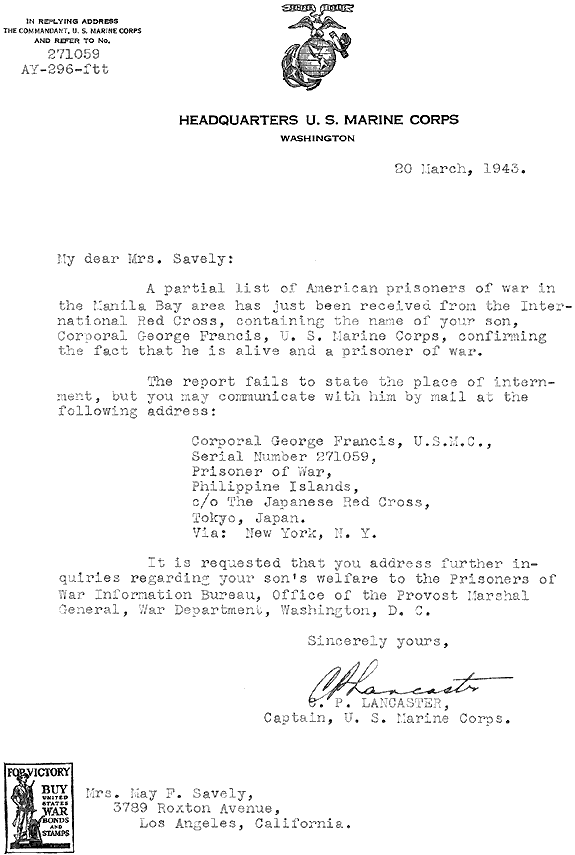 |
|
Letter received by George's Mother on March 20,
1943 - ten months after the "Missing Pending Further Information Telegram". |
|
September 8,1943
Hope to see you soon. All my love. Please give my best regards to
Jack, Peg, all my friends. |
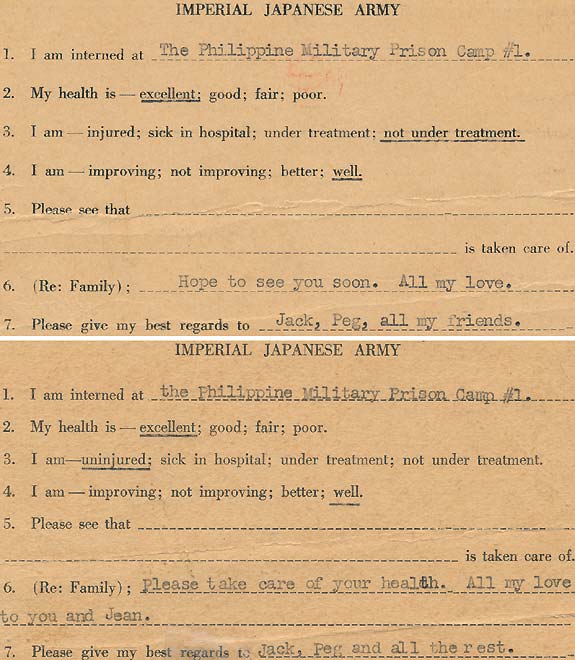 |
|
Received by George's Mother on September 8, 1943 -
another similar card was received on December 16, 1943, two months after
George was sent to Japan. |
|
Date Unknown
Dear Mother, My first letter. Received one from you Xmas, Was overjoyed. I
know
the last years have caused you much anxiety but feel that Jean and the baby
have made you very happy, My every dream and prayer is to see you both
again. I now know the true worth and richness of your love. And the debt
both Jean and I owe you. My best friend here is Dick Fulmer 4191 4th Ave.
LA. I received Jean’s letter also Dot’s, Judd’s and O.B’s. I am most proud
to be an uncle, especially a namesake. Would like some pictures as I have
none. My thoughts are with you and Jean constantly bringing all my love and
care.
As ever your son, George. |
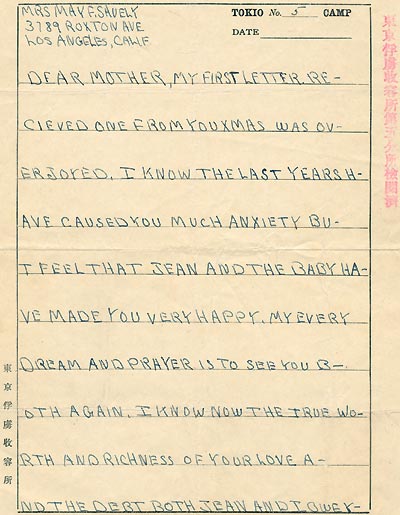 |
|
George's First Letter Home - Date Unknown |
|
March 24, 1943
Dear Mother and Jean.
Received picture of Jean. Send more as mail days with pictures are the best
days of all. Many thanks for personal parcel. They mean so much now, I think
always of our reunion and the gold days it will bring. Seems so long since I
went away often I wonder if mother’s hair is gray but that would be her so
much lovelier. I know the days are sometimes very long for me but then I am
happy knowing you are safe and well. Please do not worry about me. I still
believe in my guardian angel, so far so good. Best regards to all. Regret I
can not write to every one. My thoughts and prayers ever move homeward, All
my love. George.
August 11, 1945
Dearest Mother, I am in Japan and well, I think of you and Jean always.
Praying you
are well and taken care of. I am sure the future will find us all happy
again. Please do not worry, but smile as I would have you do. Kiss Jean,
Jack, Peg Hello.
All love, George.
August 16,1945
My Darling Son, Thank God you are safe. This is the day I’ve been living
for. I just
can’t find words to express my feelings. My prayers and thoughts have always
been with you. I hope you are all right. Can hardly wait to see you. That
will be the happiest day of my life.
I am so very very anxious for the day to arrive. When we shall be together
again and be able to do all the things you talked about.
God bless you my son.
All my love. Mother
September 12,1945
The following message has been received from your son Corporal
George Francis, USMC, for delivery to you, “Kill the fatted calf I am
coming home.
Love George.”
|
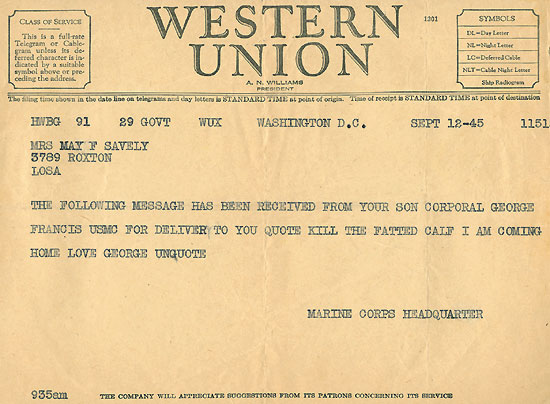 |
|
Telegram - September 12, 1945 |
|
September 13,1945
Dear Mother and Jean, This is my first letter as a free man. I seem to be in
a strange world.
A world of good food, clean sheets, all the comforts of living, things I
haven’t known for three years. At present I am in heaven (Guam). Have just
eaten, taken 2 showers and am sitting on a beautiful bed covered with white
clean sheets. Strange a month ago I was in hell. How soon I will be able to
get home I have no way of knowing. You can appreciate this. . . I’ve waited
so long for this - a little while longer won’t hurt me, I ran into Billy
Dunston aboard USS Ozark which took us out of Tokyo. You already have news
of me. I can’t tell you how much I long to put my arms round you and Jean
again. I can smell the food cooking in the kitchen - wow. Don’t worry about
me. I am in fair condition just a little tired but happy.
Right now I am very sleepy, this bed looks so inviting. Later I will try to
get off 2 more coherent letters, right now I’m just going to sleep and dream
like I did in prison camp that I’m home - with you. All my love, George.
September 23,1945
Dear Mother and Jean, I am aboard the HSV USS Ozark. Billy Duncan’s ship.
The day after
tomorrow we put in to Pearl Harbor then the last days to Frisco and home. If
you have any intentions of meeting us in Frisco, I hardly think it would be
worth while, I haven’t any idea of just what my intent will be on arrival
except to report to Dept. of Pacific Heights. From there I imagine trains to
San Diego. I don’t believe I will be able to get free in Frisco anyway. I
want to get the red tape over collect my money so I can get home and relax,
Tell Judy, Judd. . . As I said before I’ll be home...
Love George
p.s. Drop Folly a line, tell him I’m coming home.
October 5, 1945
Writing this to myself to see who will get home first. |
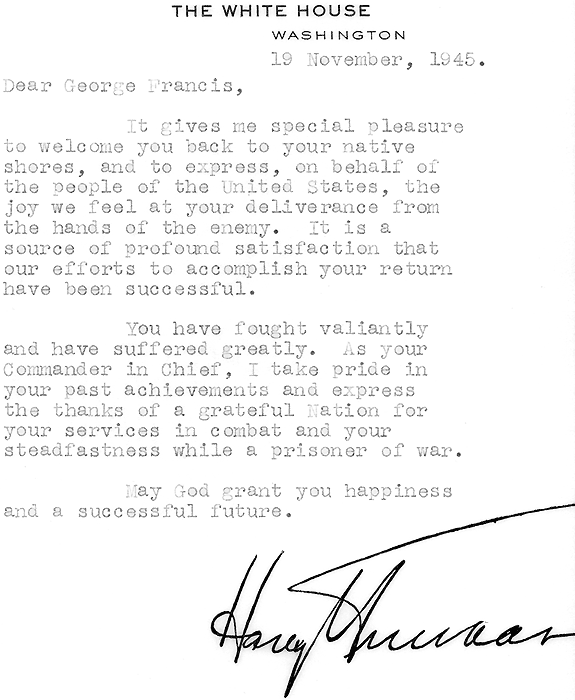 |
|
A Letter from the
White House, Welcome Home from the
Commander-in-Chief |
|
|
|
POEMS AND SHORT STORIES |
It seems that mankind will never learn from past mistakes;
and George Francis expressed it very well when he wrote the following
observations in Niigata, Japan, POW Camp 5-B -1945. |
|
DEJA VU: 1945-1990
I was sitting on a hill the other day, overlooking the city. In front of me
the ugly, blackened, smoke-belching structures of industry with the sounds
of their gratings and raspings coming back to me on the peaceful hillside.
On the other side stretched the low, verdant countryside, its blue,
shimmering canal lazily winding its way through the orderly, tilled rice
fields. Far in back the mountains rose to their crests of snow all cast in
the haze of a still summer day.
1 could not look at so peaceful a scene, with its black, ugly contrast in
the busy, humming factories, and not feel a swift rush of anguish to know
that all the world was gasping for breath to rid itself of the gargantuan
monster that had crushed its cities, ravaged its countryside and destroyed
the seed of its life in the murder of its young and strong.
I seem to hear the whole world crying in anguish, in pitiful remorse, for
this its own creation, for this its own destruction. What have the finest
creations of art, the great words of wisdom, the ringing bell of
intelligence through the decades of time, to answer for this?
Must we look at the blood that smears our mouth(s) and wets our hand(s) and
answer.. . Beast? Can we ever rise above our contemptuous stance of ego and
say: “: the superior being. Then, all within us must cry ever, ever louder,
“Beast! Beast!”
We will hide the blood, bury the crushed, distorted bodies and make of our
sorrow a crass commercial thing, and say again most loudly “I, the superior
being.” But some of us will hear, far away, like a distant echo, a cynical,
vacuous laugh, crying, “Beast! Beast!” |
|
|
|
“RESTING” |
In the hour of golden sunset
when the day nods it’s head to rest
and the sky is a trellised net
like the shades of a pirates chest.
comes the warmth of a gentle peace
and the quiet of a starlit night
and a song that will never cease
as the trains of the stars imbright
and the gold that the day has brought
is echoing in murmurous night
when the closeness of friend and thought
breathes a sigh to the hours in flight. |
|
|
|
“WASTED” |
They cried for us to save democracy and sound the call to arms
We left the things we loved for countries sake and freedom’s cause
But they left us there in that green jungle of despair
They did what they had done before-turned and walked away.
They wasted us.
When we brought our crippled bodies home so much in need of help
They smiled and said of course, but wait awhile you ask too much
We need to ponder on it and evaluate your needs
That word, no matter how they said it, never assuaged or cured,
It wasted us.
The years passed and the seed we planted grew strong beside us
Was it just a dream or did they cry again for freedom’s cause?
Were we caught this time in some old man’s myopic scheme
in lies sweetened with the beguiling taste of truth.
They wasted us again.
They took us there and left us-walked away again.
Paraded down Fifth Avenue with bands and flags and pretty girls
Orated from rostrums to cheering crowds with sycophantic words
How they saved the world for all mankind and freedom’s cause.
For God’s sake! They wasted us again. |
|
|
|
“PARADE” |
The drum major stands straight as an arrow
His baton at rest, his feet at ease.
Blue slitted eyes on the gathering troops
His ears attuned to his commanders cry.
The troops march down to the Sergeants call
With polished brass and well pressed greens.
The globe and anchor polished bright
Their Marine tradition held on high.
They move among the gathering troops
Proud symbols of an ancient craft.
Their rifles ready at shoulder arms,
Their right foot down for column right.
They turn and march among their peers
And hear the Gunney’s guttural sounds
Pushing hard on swaying backs and curving lines.
The column halts, at last that restful sound, At Ease.
All along the column front the lines go slack.
A brief rest now, a moments conversation
Before the adjutant takes his place.
But wait! Down the field a muffled drum begins.
The band is marching down the field
Precision formed in line on line.
The Drum Major’s baton slanted overhead
The drummers cadence beats, the instruments come up.
The sound of music fills the field
The field music’s flash their golden horns
The volume swells across the green filled ranks,
Each man feels the cause that brought him here.
The band in place the adjutant strides forth
Each unit pridefully calls out it’s name.
The adjutant reports and the band moves forward
To take it’s place and waits to troop the line.
When the band steps off do old legions follow close?
Is Lejune and Smedley there and Belleau heroes too?
You must see Vandegrift and Smith and Puller
and Those who fought valiantly from old Pusan to sad DaNang.
The music fills our hearts with swift and rushing pride
To serve our nation and our corps is all our patriotism.
We know too the bitter seed of failure and defeat
And the pervasive grief that comes with fallen comrades.
The commander’s voice rings down the field and echoes
Through the halls, “Pass in Review”, the green ranks
Shoulder arms, each unit turns, the band steps out,
Semper Fi. The United States Marines are on parade.
Each man hears that inner cadence, from old D.l. ‘s
That crackling sound, Hey yup, one two, one two.
The band plays their hymn, the only hymn for all Marines
Who look to see the old man’s grin and stiff salute.
The Gunny looks and chants the cadence loud and clear
Hey yup one two, Heavens streets are guarded by
And the chorus of voices loudly cry, by United States
Marines. There is no one else, you know. Hey yup, hey. |
|
|
|
“A PRISONER” |
|
EDITOR’S NOTE: The following poem was written by fellow prisoner. Kenneth
Cambon, the young Canadian who also has written a book as referenced
earlier.)
“Dear George,
In spite of all my shortcomings and defects you still accept me as friend.
In the same way I offer you this effort realizing that it, too,
unfortunately is much the same as I am.”
(signed)
Ken Cambon
Niigata, Japan April 26, 1945
“Here I wish to scroll in brief besides idle musings, the ceaseless flood of
thought - the eternal “Hither, Wither, Whenever, Why that beleaguer a
curious mind. Herein also I can think of much more that is important. The
nobleness of mind, the reality of thought that I so often find in my most
valued possessions--my friends.” |
“A PRISONER”
Oh! The blue sky, the white clouds floating gently by
make me want to live again. I hated so to die.
I still can breathe. I still can speak.
I still can hope, and still can speak.
But, I am dead and gone - gone where the dead ones lie
Oh! The round sun. It’s pleasant rays reach my face and hands
It mirrors the water and glistens up the sands.
It warms my face and tans my skin
But cannot touch the heart within
Which is dead and cold - cold in the dead ones’ land. |
|
|
|
“LOST” |
The cool breeze plays upon my cheek
like the gentle hand of a lover long ago
and the roses that throng my garden,
I would gather them like the tender thoughts
of that long lost day.
And hold their fragile blossoms so close to me
to breath their fragrance while I may and perhaps
remember them when they fade and wither
and bow their dainty heads to die. |
|
|
|
“LIL” |
|
I remember the house on Fourth Street.
For a long while it seemed I was born there. I remember the long porch with
the concrete steps leading up to it and the painted railing along it’s side.
But I remember Grandma most of all. My eyes still grow moist when I think of
her. Her sweet charity, the soft embrace of those loving arms, her gentle
eyes, the softness of her voice and the little dimple that puckered up her
cheek when she smiled. When she was close to seventy her skin still held the
roses her English heritage had given her. When she left this earth her
cheeks had that peach and cream complexion even though her eyes were
stilled.
Eight of us lived in that house on Fourth Street. It’s three bedrooms were
crowded and although the house in 1928 was deemed large, its one bathroom
was hardly adequate. That room became the focal point of my life. I was
washed, scrubbed and toileted there and when I showed any sign of fever was
admonished to retreat there and take the enema can in hand until I was
restored to health. I shuddered when I thought of it.
My Grandmother would cluck softly in sympathy for my plight and only
reinforce my growing belief that this was some sort of perversity practiced
by adults. Especially when I was ordered to take a deep breath so that I
could hold more water. Despite my scrub downs and enema sessions, the
bathroom was a great source of information.
The pearly white teeth in the glass, with Agua Caliente etched across it, I
was sure it belonged to my Grandmother. I knew it must as there were no
cigar stains of my Grandfathers smoking to mar their beauty. As with many of
the English of that day their teeth were gone sometimes long before they
were thirty. The sales of candy bars in the United kingdom is still brisk.
There were other items of interest to someone approaching puberty such as
long white pads stored in a blue carton, boxes with skulls and crossbones
which I associated with Halloween and long cylindrical balloons I could
never make work.
My Grandmother kept her house immaculately clean. You could, if you wished,
eat off the floors. Years later I realized it was part of her security to
polish and scrub and keep her house bright and company clean. Part of the
four times a year, take it out and shake it process, involved our parrot,
Billy. He knew all our names and from time to time would screech them out in
a long litany mimicking my Grandmother’s voice and end with a raucous, Paper
boy, Grocery boy and my Grandmother’s favorite word, shit. She only used the
word when she had exhausted all her patience but somehow Billy had picked it
up. My task was to give Billy a bath. My Grandmother insisted and I did what
my Grandmother insisted. Billy hated it and would rant around his cage
screeching and clawing and speaking in some unintelligible language that I
knew was parrotese for, I hate you and words I didn’t use like shit. One day
he flew against his cage in a proper rage, the door popped open and Billy
was out and after me. I ran for the screen porch and the back door. Inside I
realized Billy was on my shoulder and doing his best to eat my ear. There
was a soft voice in Billy’s ear and my Grandmother gently removed him from
my shoulder and told me to get his cage. Billy loved her and was now sitting
on her finger clucking, a peanut in his beak, making quiet sounds of peace.
One day I hand carried a note home from my Lutheran church school that asked
my Grandmother why I referred to my home as a zoo. I remember the intense
interrogation I received and the extra chores I did for that little word,
zoo. I suppose it was our parrot, our dog and a ring-tailed monkey called,
Bimbo. And probably a book I had that was all about a zoo. Bimbo was
attached to a long chain on our back yard fence and could run some thirty
feet in each direction picking up speed as he went. Like everyone else who
saw Bimbo we loved him. The small child who wandered up on the vacant lot
next to our fence was always overcome with joy to see our monkey with his
small face and long tail and arms. They would cry out in glee whenever Bimbo
in his youthful exuberance would make one of his headlong runs up and down
the fence, baring his teeth and flailing his arms as he went.
Somewhere among his youthful escapades Bimbo had discovered the taste of ice
cream. He knew that the cone it rested in was also a gourmet treat,
especially the waffle type being better than others. Simian cunning is not
to be underrated as Bimbo was soon to prove. Laying across the top of his
fence in mid- afternoon, arms sheltering
his tiny face and eyes, he would wait for the school parade to begin. Each
child in the early grades, ice cream cone in hand, had come to visit their
adored monkey. They would stand back from the fence chattering excitedly.
They would marvel at his long tail and the great length of skinny arms he
possessed, never seeing the little brown eyes watching them, measuring,
calculating. They would draw closer intrigued by this small beastie so quiet
and still on the fence top. Does lightning flash, do cannons boom, is the
hand quicker than the eye. Bimbo was all of that as he flung himself from
the fence and in one great leap had the ice cream cone in hand and was back
on his fence licking it. Not only did he have the ice cream but he had the
waffle cone. The child who was the victim of this great robbery was still
standing gazing at his empty hand in astonishment. Bimbo had turned his back
on his admirers and was enjoying his good fortune. I don’t think he cared
about the tears that were flowing behind him.
About my thirteenth year and much more sophisticated, even looking at girls
occasionally, my grandmother’s birthday had arrived and I was determined to
get her a present. My Grandfather’s generosity had filled my pockets and I
was off on the “F” streetcar to the small shops I had once seen on Main
Street in downtown Los Angeles. In a magic store full of untold treasures I
discovered a huge windup spider that lived in an ornate box, much like those
I had seen in my Grandmother’s ring case. Yes, they would gift wrap it. How
I relished the sight of my Grandmother’s face as she opened the box and that
huge hairy spider sprung out across the table. It happened that way. I had
no idea that she would clutch her hand to her chest and visibly pale as she
slumped in her chair. I was as badly frightened as she was and gathered her
in my arms to vent my contrition. I learned something that day you would
think was obvious. I loved my Grandmother. Even that small episode of
youthful ignorance did not serve me too well in the final chapter of my
Grandmother’s life.
When my Grandfather died I guess my Grandmother died with him. From a
slender girl, with long platinum hair, she had grown into the Victorian lady
that I knew. She had added a few pounds along the way but after my
Grandfather died she became an emaciated old lady. I scolded and pleaded
with her hoping she would put her grief aside. I know now that I was fearful
of losing her. When she regained consciousness in the hospital she looked at
me and said, “See, I made it.” In a few hours she was gone to that land she
always sang about. “Somewhere the sun is shining, somewhere the song birds
dwell. Somewhere........ I miss her. |
|
|
|
"MARINES IN REVIEW" |
|
“Marines in Review” George
Francis and announcer Bill Taylor |
 |
|
Technicalities - Second Lieutenant George Francis (left),
writer-producer; Captain Roger D. Rice, supervisor; Mr. Frank Morris,
ABC director; and Mr. John Neal, ABC engineer, discuss a technical point
on a recent radio broadcast of the coast-to-coast Marine-performed show.
The big show is handled by Marines familiar with radio. (Photo and
caption from TV-Radio Life Magazine, December 20-26, 1952.) |
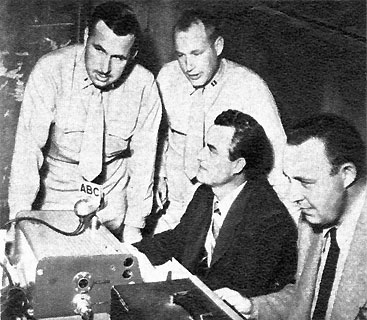 |
|
|
Much to my surprise I found a script
long lost and in my mind irretrievable. Part of the debris associated with
five years of preparing broadcast scripts for “Marines in Review”. For our
younger members it was a national radio show for the American Broadcasting
company - over 395 stations across the country.
The following script broadcast May 18, 1952 and contained some verses I had
written for Armed Forces Day and later read by Kirk Douglas to an audience
of some 65,000 gathered in the Los Angeles Coliseum for a Korean War rally.
The B.G. music was written by Al Becker. The announcer was Bill Taylor, now
an executive with a major furniture chain. Fred Lock was the Band Officer at
Pendleton at the time although Andrew O’Lesak may have conducted at this
broadcast as we often penciled in whoever had the assignment for the day.
EDITOR’S NOTE: Assigned to Camp Pendleton during the Korean War, then Master
Sergeant Francis was instrumental in creating a network radio program
“Marines in Review” that was carried by ABC in prime time for many months.
And, that was the period when George and I became friends as collaborators
and producers of this 30-minute program that dramatized famous events in
Marine Corps history interspersed with music from one of the most versatile
military bands ever assembled. |
|
|
|
MARINES IN
REVIEW
Red. 5-l3-52
Brd. 5-18-52 -9-
MUSIC (SEGUE TO "KINGS OF THE
HIGHWAY")
VOICE: I am the legions of men who have fought in all wars.
I was with Washington, with Lee and with Grant.
I stood at the Muse Argonne and by my fallen comrades at
Kasserine Pass.
I am the tired warrior who trudged the dusty
road of France to final victory.
I am the tanks, the long tome, the machine guns and rifles.
I am the army.
MUSIC: (SEGUE TO “AIRFORCE SONG”)
I am the roar of death in the sky
The bomber the fighter, the transport plane.
The crewman, the pilot, the sharp eyed bombardier.
Mine is the exultation of the great blue sky,
The feel of wings and quick smashing victory.
I am the strafer, the interceptor, the fleets of planes,
Paralyzing the heart of the enemy.
I am the Air Force.
MUSIC: (SEGUE TO “ANCHORS AWAY")
Mine are the battleships, the aircraft carriers, the destroyers and
corvettes.
Mine are the seas and waterways of the world. Mine was the billowing sails
of John Paul Jones,
The signal flags on the snapping halyard saying “well done”.
Mine was the roar of turret guns at Leyte Gulf, the sting of aircraft over
the Philippine sea.
p (MORE)
MARINES IN REVIEW
Red. 5-l3-52
Brd. 5-18-52 -10-
VOICE: I am the gray steel and the men who love the sea. I am the Navy.
MUSIC: (SEGUE TO “MARINE’S HYMN")
VOICE: I fired my musket from the rigging of the “Constitution
I fought the Merrimac at Hampton Roads
I brought glory to my name at Belleau Woods.
I have grown from the jungles of Haiti and Nicaragua,
to smash the beaches of Guadalcanal, Iwo and Okinawa.
Mine is a corps of men steeped in the tradition of their
country, and willing to die that these traditions
shall live forever.
I am the Marines.
MUSIC: (SEGUE TO “AMERICA THE
BEAUTIFUL")
I am the villages, the towns, the
cities,
Of a green and fertile land.
The broad highways the shining rivers,
and the great forests that stretch from sea to sea.
I am the men and women who throng its countryside,
from the smallest hamlets to the masses of steel and
concrete
that are the cities.
I am the spirit of a people who live in freedom,
And the soldiers, sailors and Marines,
who defend that freedom.
I am a part of them as they are a part of me.
I am the United people of a nation.
I am America.
p (MORE)
MARINES IN
REVIEW
Rcd. 5-13-52
Brd. 5-W-52 -11-
MUSIC: (FULL CHORUS AND BAND “AMERICA THE BEAUTIFUL”)
(NO APPLAUSE)
ANNCR: The Camp Pendleton Band plays the “Stars and Stripes Forever”.
MUSIC: (“STARS AND STRIPES FOREVER")
(APPLAUSE) |
|
|
|
EPILOGUE |
|
A LETTER TO MY FAMILY |
|
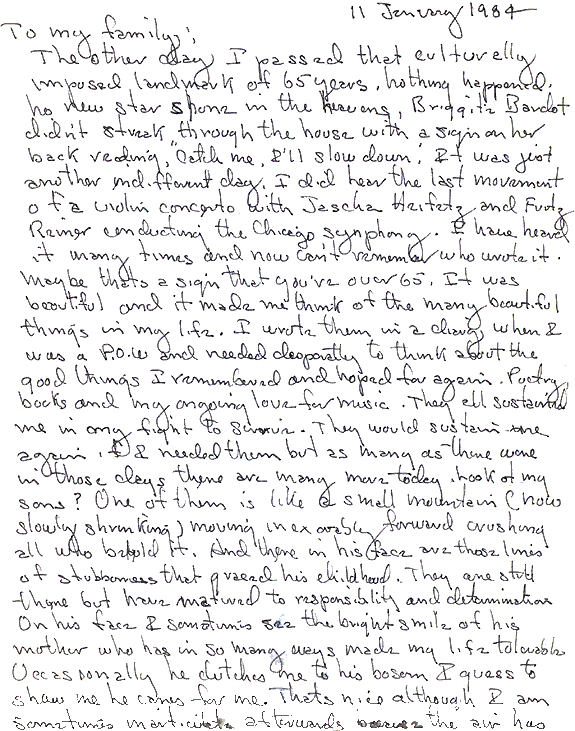
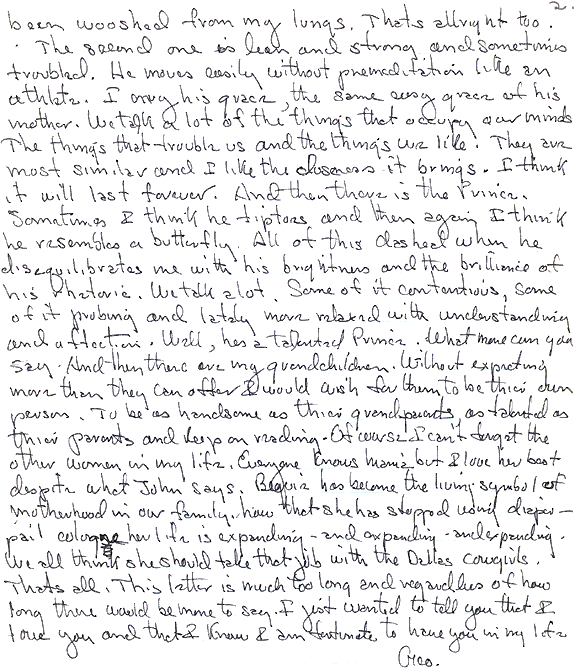
|
|
Written January 11, 1985 after George's 65th
Birthday |
|
|
|
CHRONOLOGY OF GEORGE FRANCIS |
Born - January 10, 1919
Graduated from High School - September, 1936
Enlisted U.S. Marines - April, 1939
Duty in Peking and Shanghai, China
November, 1940 to November 1941
Duty in Olongapoo, Philippines
December 6, 1941 to December 28, 1941
WAR DECLARED - December 8,1941
Duty at Corregidor - December 28, 1941 to May 6, 1942
Ordered to surrender - May 6, 1942
Prisoner in Motor Pool on Corregidor - May 7 to July, 1942
Prisoner in Cabantuan - July, 1942 to October, 1943
Prisoner in Niigata, Japan - October, 1943 to August, 1945
NUCLEAR BOMB DROPPED ON HIROSHIMA -
August 6, 1945
Allied Terms Accepted - U.S. Forces ordered to Cease Fire August 15, 1945
JAPAN SIGNS FORMAL SURRENDER - September
2, 1945
George returned home - October 5, 1945 |
|
|
|
BIBLIOGRAPHY |
|
Guest of Hirohito
Kenneth Cambon, M.D.
(PW Press)
The Last China Band
Donald L. Versaw
(Pepper Tree Publications)
Soldier of Bataan
Philip S. Brain, Jr.
(Rotary Club of Minneapolis)
Surrender and Survival
E. Bartlett Kerr
(Wm Morrow & Co)
Battles and Battlescenes of World War II
David Chandler
(Macmillan Publishing Co.) |
